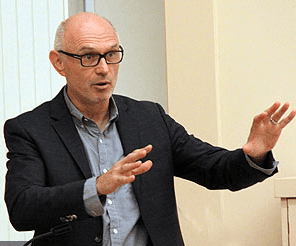 The rise of Islam in the rise of globalization and the rise of tensions in that same mix means America needs a new kind of public intellectual. A public intellectual, not in the sense of having technological or scientific expertise and whom we can consult on CNN/Fox News when the need arises. Not that kind of public intellectual. Instead, we need the kind who can interpret what’s happening in globalization in a way that puts paid to the now defunct secularization theory.
The rise of Islam in the rise of globalization and the rise of tensions in that same mix means America needs a new kind of public intellectual. A public intellectual, not in the sense of having technological or scientific expertise and whom we can consult on CNN/Fox News when the need arises. Not that kind of public intellectual. Instead, we need the kind who can interpret what’s happening in globalization in a way that puts paid to the now defunct secularization theory.
Facts prove that our world is not getting less religious and falling one and all for empricism and scientism. Our world is as — if not more — religious as it has always been. Because we are either on the precipice of a “clash of civilizations” or “beyond” that supposed clash (I have no bone in this one argument), we need someone who can explain world religions and through that explanation offer proposals for peace-making.
I nominate Miroslav Volf, a scholar who has theological chops and who has spent a good decade exploring more extensively both globalization as it impinges on world religions (all of them) and world religions as they are shaping globalization. Enter his new book Flourishing: Why We Need Religion in a Globalized World. His book is about the good life, or human flourishing, and how world religions can shape the globalization process to bring about greater flourishing.
As I go through this new book of his, I will offer my own angles, but today’s post is designed to get the big picture in mind. World religions, and he takes a firm stand in this book on orthodox Christian faith, each offer visions of flourishing. Christianity’s is the verdant garden of Eden and the universal, flourishing city of the new heavens and the new earth. Volf: “The promise of these visions of flourishing is a prize jewel in the treasury of the Christian faith, one of its best gifts to the world. Adherents of other religions and secular humanists perhaps use different images, but their own faiths offer a similar pledge of hope” (xi). He continues:
The claim is this: far from being a plague on humanity, as many believe and some experience, religions are carriers of compelling visions of flourishing (xi).
After asserting that world religions are the original carriers of globalization (I might suggest Hellenism under Alexander the Great), Volf offers what he calls a “charcoal sketch” of the relationship of world religions, globalization and flourishing.
His belief is that of engagement: “I believe that faith and politics are two distinct cultural systems but that an authentic faith is always engaged, at work to relieve personal suffering as well as to push against social injustice, political violence, and environmental degradation” (9). A posture then of waiting is an engaged kind of waiting.
The essence of the Christian vision of flourishing — you will know I loved hearing this — is to love God and to love others, and so he wants to ask how globalization furthers and hinders loving God, and he wants to know the same for loving others. But he doesn’t take globalization to be a benign presence. “Put slightly differently, life marked by love for God and neighbors, flourishing human life, is the end; globalization is a means, valuable insofar as it enables us to achieve that end” (16, my italics).
But he stands here as a Christian — in the Eastern European, Pentecostal, evangelical, Moltmannian traditions — with this:
As a Christian, who believes that Jesus Christ is the measure of true humanity, the incarnation of love for God and others, my normative assessment of globalization boils down to this: it is good to the extent that it helps me and others participate in the character and mission of Jesus Christ, and it is deficient to the extent that it doesn’t (16-17, my emphasis).
He has, in other words, a Christian theology of flourishing and he thinks other world religions can share in that vision on their own bases and within their own religions. The temptation today — this was a brilliant page or two — is “to live by bread alone.” He sees this in both communism and capitalism, and things both succumb to the bread alone theory of flourishing, and that bread is not enough. So the aim is to show that transcendence in God alone is the bread that leads to the bread of flourishing. I’ll say it again: we need the kind of public intellectual that Volf has become.











